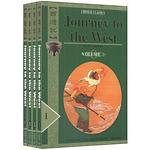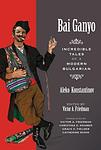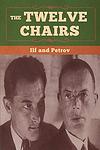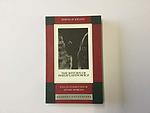The Greatest Non-Western "Satire" Books of All Time
Click to learn how this list is calculated.
This list showcases a comprehensive and trusted collection of the greatest books from Non-Western literature. Curated through a specialized algorithm, it amalgamates 300 'best of' book lists to present a definitive guide to essential literary works from Asia, Africa, the Middle East, Latin America, and beyond. This selection celebrates the diverse and vibrant literary traditions of the world, offering readers a window into a myriad of fascinating narratives and perspectives. For more information on how these books are selected, please visit the rankings page.
Genres
Satire is a genre of literature that uses humor, irony, and exaggeration to criticize and ridicule human vices, follies, and shortcomings. It is a form of social commentary that aims to expose the flaws and absurdities of society, politics, and culture. Satirical books often employ sarcasm, wit, and parody to challenge the status quo and provoke thought and reflection in readers. Satire can be both entertaining and thought-provoking, and it has been used throughout history as a powerful tool for social and political critique.
Date Range
Reading Statistics
Click the button below to see how many of these books you've read!
Download
If you're interested in downloading this list as a CSV file for use in a spreadsheet application, you can easily do so by clicking the button below. Please note that to ensure a manageable file size and faster download, the CSV will include details for only the first 500 books.
Download-
1. Midnight's Children by Salman Rushdie
The novel tells the story of Saleem Sinai, who was born at the exact moment when India gained its independence. As a result, he shares a mystical connection with other children born at the same time, all of whom possess unique, magical abilities. As Saleem grows up, his life mirrors the political and cultural changes happening in his country, from the partition of India and Pakistan, to the Bangladesh War of Independence. The story is a blend of historical fiction and magical realism, exploring themes of identity, fate, and the power of storytelling.
-
2. Ferdydurke by Witold Gombrowicz
"Ferdydurke" is a satirical novel that explores the themes of maturity, identity, and societal norms. The protagonist, a thirty-year-old writer, is forcibly regressed by two professors back to his adolescence and placed in a school setting. The narrative critiques the artificiality of adulthood and the pressure of societal expectations, while also exploring the struggle for self-expression and individuality. The book is known for its absurdist humor and its examination of the human condition.
-
3. Waiting for the Barbarians by J M Coetzee
The novel is set in a small frontier town of an unnamed empire, where the magistrate lives a life of civil service and relative peace. His world is disrupted when the Empire declares a state of emergency due to rumors of barbarian uprising. The magistrate becomes a critic of the Empire's brutal and inhumane methods of dealing with the perceived threat, which leads to his arrest and torture. As he tries to understand his role in the vast political machinery, he also grapples with questions of power, justice, and humanity.
-
4. Journey to the West by Wu Cheng'en
"Journey to the West" is a classic Chinese novel that follows the adventures of a Buddhist monk and his three disciples, a monkey, a pig, and a river monster, as they travel from China to India in search of sacred Buddhist scriptures. Along the way, they face a series of challenges and obstacles, including battling demons and overcoming their own personal weaknesses. This epic tale is a blend of mythology, folklore, and fantasy, and is also a commentary on the practice and principles of Buddhism.
-
5. The Posthumous Memoirs of Bras Cubas by Machado de Assis
The novel is a unique and satirical work, narrated by a dead man, Bras Cubas, who recounts his life from beyond the grave. The story is filled with ironic humor and philosophical musings as Bras Cubas explores his past, his relationships, and the societal norms of his time. The narrative breaks conventional storytelling norms, often addressing the reader directly and jumping through time without warning. Themes of love, wealth, power, and the human condition are explored, providing a critique of 19th-century Brazilian society.
-
6. Northanger Abbey by Jane Austen
"Northanger Abbey" is a coming-of-age novel that follows the story of Catherine Morland, a young and naive girl who is invited to stay with the wealthy Tilney family at their estate, Northanger Abbey. Catherine's imagination is fueled by her love for gothic novels, leading her to create fantastical scenarios in her mind. As she navigates the complexities of society and falls in love, Catherine learns valuable lessons about the dangers of letting her imagination run wild and the importance of distinguishing reality from fiction.
-
7. Los Siete Locos by Roberto Arlt
"Los Siete Locos" is a complex and dark novel set in the 1920s in Buenos Aires. The story revolves around a man who, disillusioned with his mundane life and the corruption he sees around him, becomes involved with a group of anarchists who plan to overthrow the government. The protagonist is drawn into a world of madness, conspiracy, and philosophical debate, as he grapples with his own sanity and the morality of his actions. The book explores themes of existentialism, societal decay, and the blurred line between sanity and insanity.
-
8. All about H. Hatterr by G. V. Desani
This novel is a unique blend of Eastern philosophy and Western literary technique, following the adventures of its protagonist, a British-educated Indian everyman, as he navigates the complexities of life. The narrative is filled with humor, satire, and linguistic playfulness, as the protagonist interacts with various eccentric characters and experiences numerous absurd situations. The book is a critique of both British colonialism and traditional Indian society, offering a distinctive and insightful perspective on the human condition.
-
9. A Tomb for Boris Davidovich by Danilo Kiš
"A Tomb for Boris Davidovich" is a collection of seven short stories exploring the nature of political and personal identity, primarily in Eastern Europe during the 20th century. The stories are interconnected, each focusing on a different character who is caught up in the political turmoil of the time, often meeting tragic ends. The book is known for its exploration of totalitarianism, the nature of identity, and the power of the state over the individual.
-
10. The White Tiger by Aravind Adiga
"The White Tiger" is a darkly humorous novel set in modern-day India that explores the country's class struggle through the eyes of an ambitious and cunning protagonist. Born in a poor village, he moves to Delhi to work as a chauffeur for a rich family. He eventually breaks free from his life of servitude by committing an act of shocking violence, and uses his newfound freedom to become a successful entrepreneur in Bangalore. The story, told through a series of letters written to the Chinese Premier, is a scathing critique of India's social and economic disparities, and the corruption that permeates all levels of society.
-
11. Aunt Julia and the Scriptwriter by Mario Vargas Llosa
The novel is a semi-autobiographical tale of a young man in Peru who falls in love with his divorced aunt, Julia, while working at a radio station. Their scandalous romance unfolds amidst the backdrop of a chaotic radio station run by a brilliant but unstable Bolivian scriptwriter who churns out daily soap operas. The narrative alternates between the protagonist's real life and the melodramatic world created by the scriptwriter, blending reality and fiction in a humorous and poignant exploration of love and creativity.
-
12. The Autumn of the Patriarch by Gabriel García Márquez
The novel explores the life of an eternal dictator who has ruled over a Caribbean nation for several decades. The patriarch's oppressive regime is marked by corruption, violence, and absurdity, while his personal life is characterized by loneliness and paranoia. The narrative is a complex, non-linear exploration of power, time, and the dehumanizing effects of political tyranny. The patriarch's death prompts a reflection on his life and reign, revealing a mythical, magical, and horrifying reality.
-
13. Bai Ganyo by Aleko Konstantinov
"Bai Ganyo" is a satirical novel that follows the eponymous protagonist, a comically boorish Bulgarian rose-oil merchant, as he travels through various European cities. The book humorously critiques the cultural misunderstandings and faux pas that Bai Ganyo commits, which serve as a metaphor for the broader social and political foibles of Bulgarians during the post-liberation period from Ottoman rule. Through a series of vignettes, the protagonist's adventures expose the clash between traditional Bulgarian ways and modern European society, ultimately offering a sharp commentary on the challenges of cultural integration and the preservation of national identity in the face of globalization.
-
14. The Twelve Chairs by Ilya Ilf, Evgeniy Petrov
In this satirical novel, a former nobleman and a con artist form an unlikely partnership in pursuit of hidden treasure. After the Russian Revolution, fortunes are overturned, and the nobleman learns that his family jewels were sewn into one of the twelve chairs from a dining room set. As the chairs have been scattered by the new Soviet regime, the duo embarks on a wild chase across the USSR, encountering a colorful cast of characters and navigating the absurdities of the communist system. Their quest for wealth is a humorous reflection on human greed and the ironies of fate in a society undergoing radical change.
-
15. Odessa Stories by Isaac Babel
"Odessa Stories" is a collection of short stories set in the bustling city of Odessa, Ukraine, during the early 20th century. Through vivid and colorful characters, the book explores the vibrant and diverse Jewish community of Odessa, capturing their struggles, dreams, and everyday lives. With a blend of humor, tragedy, and satire, the stories paint a rich portrait of a city and its people, offering a unique glimpse into a bygone era.
-
16. The Little Golden Calf by Evgeniy Petrov, Ilya Ilf
The book is a satirical novel that follows the adventures of a charming con artist in the Soviet Union during the 1920s. The protagonist, with a combination of wit, luck, and audacity, navigates through the absurdities of the Soviet bureaucracy and the remnants of the pre-revolutionary elite in pursuit of a mythical treasure. His journey is marked by a series of humorous episodes that expose the contradictions and ironies of the early Soviet society, ultimately offering a sharp critique of human greed and the folly of the era's political and social systems.
-
17. Macunaíma by Mario de Andrade
This book is a hallmark of Brazilian literature, blending folklore, social critique, and surrealism to narrate the adventures of its eponymous hero, a shapeshifting character of indigenous origin who embarks on a journey from the Amazon rainforest to the city of São Paulo. Throughout his quest to retrieve a magical amulet stolen by a fearsome giant, the protagonist encounters a myriad of mythical creatures, gods, and figures from Brazilian folklore, all while satirizing the cultural and social issues of early 20th-century Brazil. The narrative is celebrated for its inventive language, playful use of Brazilian vernacular, and its pivotal role in the Brazilian Modernist movement, offering a unique exploration of national identity, racial diversity, and the complex relationship between tradition and modernity.
-
18. The Great Indian Novel by Shashi Tharoor
This book is a satirical take on Indian politics and history, cleverly intertwined with characters and events from the epic Mahabharata. The narrative presents a parallel between the two, with the characters in the novel mirroring significant figures from India's political scene during the Independence and post-Independence era. The book is a humorous yet thought-provoking critique of Indian society and politics, offering a unique blend of myth, history, and satire.
-
19. Grendel by John Gardner
"Grendel" is a thought-provoking novel that retells the epic Beowulf from the perspective of the monster, Grendel. The book explores themes of existentialism, morality, and the nature of humanity as Grendel navigates his lonely existence and interacts with various characters, including the heroic Beowulf. Through his introspective musings, Grendel challenges traditional notions of good and evil, ultimately questioning the purpose and meaning of life.
-
20. Satyricon by Petronius
The book in question is a satirical Roman work that provides a vivid, episodic portrayal of the decadent society during the reign of Nero. It follows the misadventures of the narrator and his companions as they navigate a world of excess, corruption, and hedonism. Through a series of events ranging from banquets to shipwrecks, the narrative offers a critique of the moral decay of Roman society, using humor, irony, and the perspective of characters from various social strata. The fragmented nature of the surviving text adds to its enigmatic and chaotic depiction of the period's social mores.
-
21. The Futurological Congress by Stanislaw Lem
In a dystopian future, the protagonist attends a scientific conference where he is exposed to a new hallucinogenic drug that transports him to a surreal and chaotic world. As he navigates through this bizarre reality, he becomes entangled in a conspiracy involving mind-altering technology, political manipulation, and the struggle for power. This satirical novel explores themes of reality, identity, and the dangers of unchecked technological advancements.
-
22. Tent of Miracles by Jorge Amado
"Tent of Miracles" is a satirical novel that explores the themes of racism, colonialism, and the power of knowledge. The story revolves around the life of a poor, mixed-race Bahian scholar who is unrecognized in his own land but becomes a posthumous celebrity when a Nobel laureate praises his work. This sudden fame brings attention to his writings and his message against racial discrimination, and the book also portrays the vibrant culture and diversity of Bahia, Brazil.
-
23. On the Edge of Reason by Miroslav Krleža
"On the Edge of Reason" is a satirical novel that explores the life of a lawyer who, after publicly criticizing a corrupt official, finds himself ostracized from society. The protagonist's life unravels as he is alienated by his friends, colleagues, and the society he once held in high regard. This leads him to question the rationality of the world around him and the meaning of justice, ultimately driving him to the brink of sanity. The book provides a scathing critique of hypocrisy, corruption, and the herd mentality prevalent in society.
-
24. The Return of Philip Latinowicz by Miroslav Krleža
"The Return of Philip Latinowicz" is a novel about a successful artist who, after living in the city for three decades, decides to return to his rural hometown in order to find inspiration for his next piece of work. As he reconnects with his past and the people from his childhood, he begins to question the meaning of his art and his own identity. The book explores themes of existentialism, the nature of art, and the struggle between modernity and tradition.
-
25. Insatiability by Stanisław Ignacy Witkiewicz
The novel is a dystopian narrative set in a future where a new Asian empire has conquered Europe. The story follows a young Polish man who, while initially indulging in hedonistic pursuits, becomes increasingly disillusioned with the world around him. As the new empire introduces a mysterious substance known as Murti-Bing pills, which create a sense of contentment and indifference in the populace, the protagonist grapples with the loss of individuality and the erosion of human spirit in society. The narrative is a critique of totalitarian regimes and the dangers of mass conformity.
Reading Statistics
Click the button below to see how many of these books you've read!
Download
If you're interested in downloading this list as a CSV file for use in a spreadsheet application, you can easily do so by clicking the button below. Please note that to ensure a manageable file size and faster download, the CSV will include details for only the first 500 books.
Download























